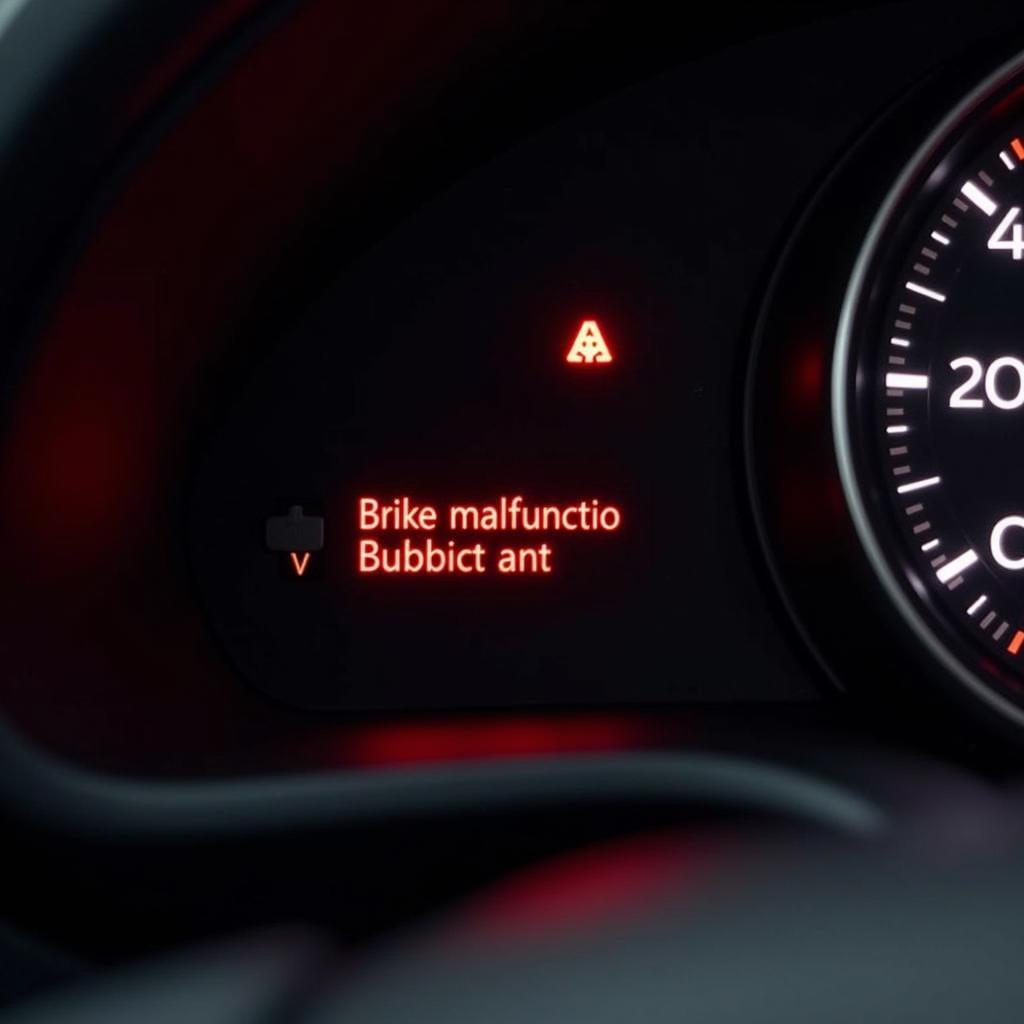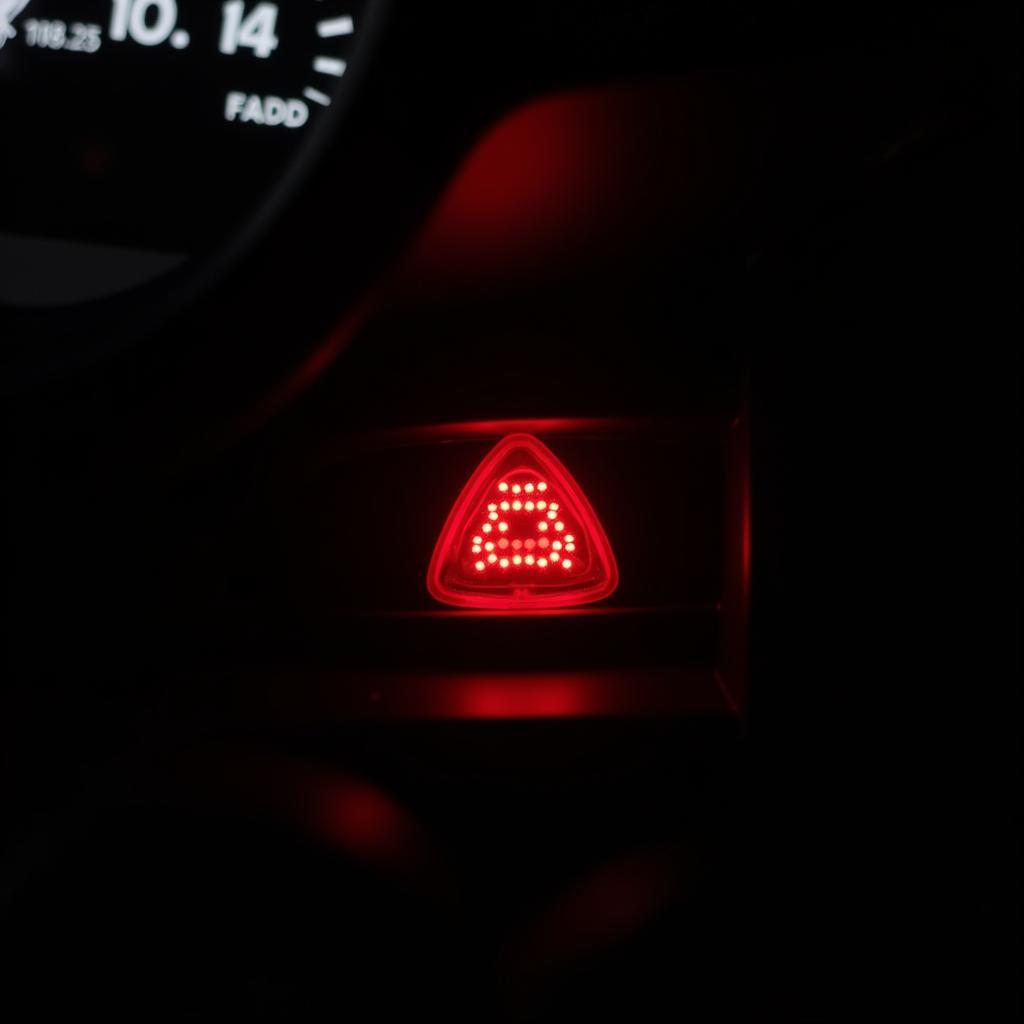The dreaded “Brake Malfunction” warning light illuminating your Audi A1’s dashboard can trigger instant worry. This alert, often accompanied by a beep or chime, signals a potential problem within your car’s complex braking system. While it’s natural to feel concerned, understanding the common causes and solutions can help you address the issue effectively.
This comprehensive guide will delve into the intricacies of brake malfunction warnings in Audi A1 vehicles, empowering you with the knowledge to resolve the problem and restore your peace of mind.
Common Causes of Brake Malfunction Warnings in Audi A1
Several factors can trigger a brake malfunction warning in your Audi A1. Here are some of the most common culprits:
-
Low Brake Fluid Level: Brake fluid is the lifeblood of your car’s braking system, transmitting the force from your foot on the pedal to the brake calipers. A low brake fluid level, often caused by worn brake pads or a leak in the system, can hinder this process and trigger the warning light.
-
Worn Brake Pads: Brake pads are designed to wear down over time with regular use. As they thin, their ability to generate friction and slow down the vehicle diminishes, potentially activating the warning system.
-
Faulty Brake Pad Sensor: Modern Audi A1s come equipped with brake pad wear sensors that monitor the thickness of your brake pads. When the pads wear down to a certain level, the sensor triggers the warning light, prompting you to replace them.
-
ABS Sensor Issues: The Anti-lock Braking System (ABS) is crucial for preventing wheel lockup during hard braking. A malfunctioning ABS sensor can disrupt this system, leading to a brake malfunction warning.
-
Problem with the Brake Master Cylinder: The brake master cylinder plays a critical role in distributing brake fluid to the wheels. A fault in this component, such as a leak or internal failure, can compromise braking performance and activate the warning.
-
Electrical Issues: Like any modern vehicle, the Audi A1 relies on a complex network of sensors and electrical components to manage its braking system. A faulty sensor, wiring harness problem, or a blown fuse can interrupt these signals, leading to a false warning.
 Audi A1 Dashboard Displaying Brake Malfunction Warning Light
Audi A1 Dashboard Displaying Brake Malfunction Warning Light
What to Do When the Brake Malfunction Warning Appears
If the brake malfunction warning light illuminates while driving your Audi A1, it’s crucial to act cautiously and take the following steps:
-
Stay Calm and Assess the Situation: Panicking will not help. Safely pull over to the side of the road as soon as possible, avoiding sudden braking if you can.
-
Check Your Brake Fluid Level: With the engine off and the car parked on a level surface, carefully open the hood and locate the brake fluid reservoir. Check the fluid level, ensuring it falls within the “Min” and “Max” markings on the reservoir. If the level is low, adding brake fluid might temporarily alleviate the warning, but it’s crucial to have your car inspected by a qualified mechanic to diagnose the underlying cause.
-
Inspect Your Brake Pads: If you’re comfortable doing so, you can visually inspect your brake pads for signs of excessive wear. Look for thin pads or metal-on-metal contact, which indicates severely worn pads that require immediate replacement.
-
Avoid Driving if Possible: If the brake fluid level is extremely low, you notice signs of severe brake pad wear, or the warning light remains illuminated despite adding brake fluid, it’s strongly advised to avoid driving your Audi A1 until a professional mechanic can diagnose and repair the issue.
Diagnosing the Brake Malfunction Warning: Remote Diagnostics and Software Solutions
Modern automotive technology has paved the way for advanced diagnostics and software solutions that can help pinpoint the root cause of a brake malfunction warning in your Audi A1.
-
Remote Diagnostics: Specialized software and equipment allow qualified technicians to access your Audi A1’s onboard computer remotely, retrieving diagnostic trouble codes (DTCs) that provide valuable insights into the specific area of the braking system triggering the warning. This eliminates guesswork and enables a more targeted approach to repair.
-
Software Updates and Programming: In some instances, a brake malfunction warning might stem from a software glitch within the car’s electronic control unit (ECU). Reprogramming the ECU with the latest software updates from Audi can often resolve these issues.
When to Seek Professional Help
While checking your brake fluid and visually inspecting your brake pads can provide some initial clues, it’s essential to remember that diagnosing and repairing a modern car’s braking system requires specialized knowledge, tools, and expertise.
Consider seeking professional assistance from a qualified Audi technician or a reputable mechanic specializing in European vehicles if:
- The brake malfunction warning persists after adding brake fluid.
- You notice any unusual noises, such as grinding or squealing, when applying the brakes.
- Your brake pedal feels spongy, soft, or requires more pressure than usual to slow down the vehicle.
- You are unsure about any aspect of inspecting or addressing the brake malfunction warning.
 Mechanic Inspecting Audi A1 Brake System
Mechanic Inspecting Audi A1 Brake System
Preventing Future Brake Issues in Your Audi A1
Proactive maintenance is key to preventing future brake problems and ensuring the long-term reliability of your Audi A1. Here are some preventative measures to consider:
-
Adhere to Scheduled Brake Inspections: Consult your Audi A1 owner’s manual for recommended brake inspection intervals. Regular inspections by a qualified technician can help identify minor issues before they escalate into major problems.
-
Timely Brake Pad Replacement: Don’t ignore the brake pad wear indicator. Replace your brake pads as soon as the warning light appears or when a mechanic recommends it.
-
Quality Brake Fluid and Regular Flushes: Use high-quality brake fluid that meets Audi’s specifications for your A1. Regular brake fluid flushes, typically every two to three years, help maintain optimal braking performance and prevent corrosion within the system.
-
Mindful Driving Habits: Aggressive driving, such as hard braking and rapid acceleration, can put excessive strain on your brakes, leading to premature wear. Adopting smoother driving habits can help prolong the lifespan of your brakes.
Conclusion
A brake malfunction warning in your Audi A1 should never be ignored. By understanding the common causes, taking appropriate immediate actions, and seeking professional assistance when needed, you can address the issue effectively and ensure your safety on the road.

